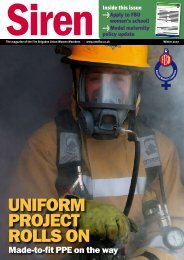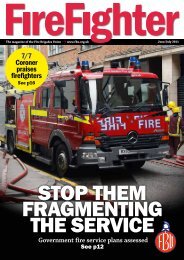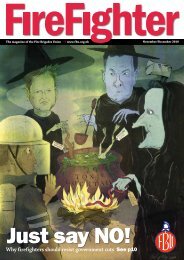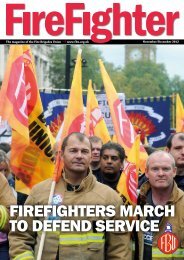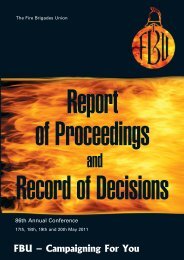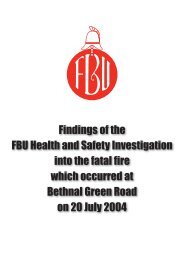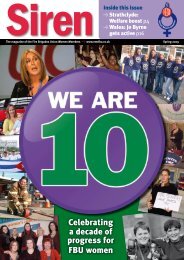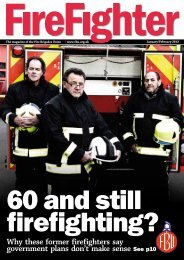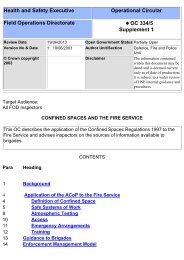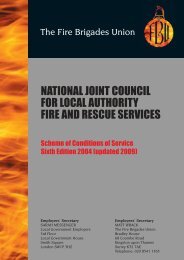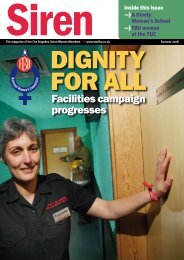Report - Fire Brigades Union
Report - Fire Brigades Union
Report - Fire Brigades Union
Create successful ePaper yourself
Turn your PDF publications into a flip-book with our unique Google optimized e-Paper software.
SECTION B — FIRE AND RESCUE SERVICE POLICY<br />
existing FRA, and become their own commissioning unit.<br />
We would expect that many of the smaller new FRAs<br />
would band together with others in the locality, to procure<br />
services from a single service provider. Each FRA would<br />
maintain its statutory responsibilities both to the local<br />
community, and its wider responsibilities to society at<br />
large. It will also be essential that appropriate standards are<br />
maintained. In this respect, ensuring that an FRA continues<br />
to fulfil its own local and national obligations will be a key<br />
function of the National Framework.<br />
Required government action to enable implementation of<br />
this model include: possible legislation to enable a shift in<br />
powers and structures to take place – although the<br />
Sustainable Communities Act 2007 offers the ability to<br />
transfer functions. It is hoped that the Localism Bill will<br />
enable people to take these powers into their own hands.<br />
We believe that the difficulty in bringing services together<br />
to act co-operatively arises from the lack of separation<br />
between the commissioning and delivery roles, where<br />
clear expectations have not been clearly set out. In<br />
awarding services the commissioning authority will need to<br />
ensure that the delivery agent has adequate training and<br />
operational procedures. These will need to be underpinned<br />
by requirements under the National Framework.<br />
The Government would need to establish, under the<br />
framework mechanism, appropriate standards for fire<br />
commissioning, and in particular it will need to ensure the<br />
appropriate mechanisms for national resilience are<br />
maintained.<br />
Finally, and of considerable importance, the Government<br />
will need to maintain an independent assurance<br />
mechanism ensuring the effectiveness of the whole<br />
system, particularly in relation to interoperability and<br />
national resilience, and the ability to intervene in the case<br />
of service failure. It would make absolute sense to have<br />
this final assurance role placed with the Chief <strong>Fire</strong> and<br />
Rescue Adviser. This role would focus on light touch<br />
assurance, but would have the capacity to intervene in<br />
cases of possible service failure. The role of the Chief <strong>Fire</strong><br />
and Rescue Adviser would be supported in this by a<br />
regime of self-assessment and peer review, led by the<br />
sector. However, we also feel that there is a role for<br />
consumer based involvement in this process similar to<br />
HealthWatch, that proposed by the Department of Health<br />
for the National Health Service. We would expect both<br />
individual citizens and the industry to contribute to this.<br />
Introducing Mutualisation and Social Enterprises into<br />
the <strong>Fire</strong> and Rescue Services<br />
A mutual, mutual organisation, or mutual society is an<br />
organisation which is owned by its members and with no<br />
outside shareholders who need a cut of the profits.<br />
Mutualised public services, in contrast to centralised state<br />
funded services save money in many cases because they<br />
are able to generate income and raise private finance,<br />
including grant and social investment. Mutuals are also by<br />
their nature social enterprises.<br />
In August, the Minister for the Cabinet Office, Francis<br />
Maude, announced the first wave of Pathfinder mutuals, to<br />
be run by public sector staff. These pathfinders will be<br />
trailblazers for the rest of the public sector – helping<br />
government to establish, by learning from the front line,<br />
what type of support and structures will best enable the<br />
development of employee-led mutuals on an ongoing<br />
basis. We understand that some fire services have already<br />
expressed an interest in this agenda.<br />
To further inform this thinking, we have engaged with the<br />
Office of Public Management (OPM), the Cabinet Office<br />
and Public Services 2020 to discuss emerging policy and<br />
practical opportunities related to employee mutuals and<br />
joint ventures. Recent studies by the OPM suggest that<br />
alternative ownership models offer three potential benefits<br />
for public services:<br />
●<br />
●<br />
●<br />
Improved organisational performance and efficiency<br />
Employee and user engagement, with its resulting<br />
influence on service improvement<br />
Wider benefits to society resulting from a greater<br />
sense of citizen empowerment and responsibility.<br />
For potential commissioning authorities and policy makers,<br />
or for provider organisations considering a transition from<br />
existing public services to new ownership forms, three<br />
models are likely to be most relevant:<br />
● Employee-owned organisations<br />
● Community ownership<br />
● Employee plus.<br />
OPM suggest that the transition to shared ownership has<br />
four main stages, which we can think of in terms of the<br />
whole system and the local systems. These are:<br />
1. Options appraisal<br />
2. Negotiating the terms of the transition<br />
3. Transition<br />
4. Post-transition.<br />
At each of these stages, there will be issues about<br />
supporting change, developing the business model,<br />
engaging with staff and dealing with HR issues like<br />
pensions, legal forms of ownership and governance<br />
structures, and leadership.<br />
We think that mutuals should be encouraged in the fire and<br />
rescue service. We consider that this would be of particular<br />
interest to the retained service, where there is a view that<br />
the current arrangements have not served them or their<br />
communities well. By allowing communities to once again<br />
be responsible for their own stations, not only will there be<br />
a renewed sense of pride in the services offered, but a<br />
new focus for the community, ensure an adequate supply<br />
of firefighters, make full use of the station facilities and<br />
raise funds for future development.<br />
However, these proposals are not limited to the retained,<br />
and there are significant opportunities for wholetime staff<br />
to take control of their own destinies, and operate their<br />
own fire and rescue services. On this basis we think that it<br />
56 FBU Annual <strong>Report</strong> 2011





